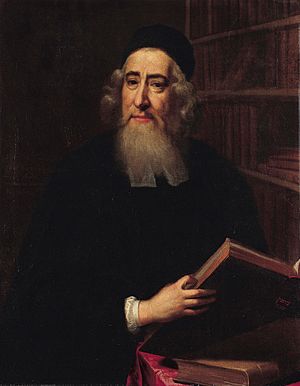Aaron Hart (rabbi) facts for kids
Quick facts for kids Aaron Hart |
|
|---|---|
 |
|
| Religion | Judaism |
| Personal | |
| Born | Aaron Uri Phoebus Hart 1670 Breslau, Silesia, Holy Roman Empire |
| Died | 1756 (aged 85–86) London, United Kingdom |
| Senior posting | |
| Title | Rabbi of the Great Synagogue |
| Predecessor | Judah Loeb ben Ephraim Anschel (Cohen or Ha-Kohen) / Aaron the Scribe of Dublin (temp., c. 1700–1704) |
| Successor | Hart Lyon |
| Synagogue | Great Synagogue of London |
| Began | 1704 or 1705 |
| Ended | 1756 |
Rabbi Aaron Uri Phoebus Hart (Hebrew: רבי אהרן אורי פײבוש הרט; 1670 – 1756) was a very important Jewish leader in Great Britain. He served as the main rabbi for the Ashkenazi community at the Great Synagogue of London from 1704 until he passed away. Many people consider him to be the first chief rabbi of Great Britain.
Contents
Biography
Early Life and Education
Aaron Hart was born in 1670 in Breslau, a city in Silesia. His father, Hartwig Moses Hart, was also a rabbi. Aaron studied at a yeshiva in Poland. A yeshiva is a special school where Jewish students learn about the Torah and Jewish law. After his studies, he married the daughter of Rabbi Samuel ben Phoebus.
Becoming a Rabbi in London
Around 1704 or 1705, Rabbi Hart was chosen to be the rabbi of the first Ashkenazi synagogue in London. The Ashkenazi Jews are a large group of Jewish people who originally came from Central and Eastern Europe. His wealthy brother, Moses Hart, helped him get this important position. Moses Hart was a founder and leader (called a parnas) of the Great Synagogue in London.
A Disagreement in the Community
In 1706, Rabbi Hart approved a divorce that caused some disagreement. A community member named Marcus Moses questioned this decision. Rabbi Hart responded by using a special Jewish ruling to separate Marcus Moses from the community. This was a very serious step.
Marcus Moses then asked other rabbis for their opinion. Many of them felt that the punishment was too harsh. However, Rabbi Hart decided to keep the separation in place. Because of this, Marcus Moses had to start a new synagogue, which later became known as the Hambro synagogue.
First Hebrew Book in London
In 1707, Rabbi Hart wrote a book to explain his side of the disagreement. The book was called Urim ve-Tummim. This book is very special because it was the first book ever printed entirely in Hebrew in London. Another rabbi, Jochanan Holleschau, wrote a book in response to Rabbi Hart's work.
His Legacy
Rabbi Aaron Hart served as the chief rabbi for over 50 years until his death in 1756. He played a key role in establishing the Jewish community in London. Today, a portrait of Rabbi Hart can be seen at the National Portrait Gallery in London.
 | May Edward Chinn |
 | Rebecca Cole |
 | Alexa Canady |
 | Dorothy Lavinia Brown |

